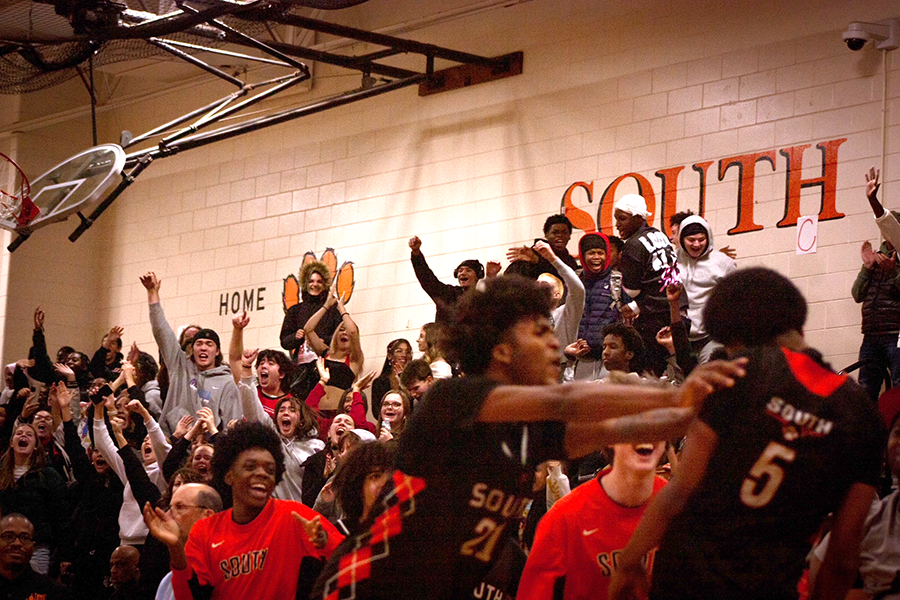When Googling “women’s sports,” one of the first options that comes up is “women’s sports are a joke.” What does this say about the way female athletes are perceived in our society? At South, things may be different from the world of the professional sports, but women on sports teams still feel the preference for men’s sports.
“Girls’ teams don’t get the same attention [as boys’],” said junior Zoe Hartman, “it’s kind of discouraging.”
Hartman has played three sports at South; cross country running, cross country skiing, and track. “I think they’re slightly under-appreciated,” she said, “I’ve noticed that the guys are more focused on.”
This is also the case for other sports. Senior Kaneesha Green sees the preference for men’s teams in the sport she plays, basketball.
“I think people support men’s sports more,” she said, “when I was playing basketball I went to men’s games and there were way more fans, even though they had a worse record than we did.”
“The only time women’s sports are appreciated is when they are winning.” says sophomore Vina Onyango-Robshaw. “I think they should be supported and appreciated even when they’re not doing so good, because that gives us the encouragement to get better, and shows that someone cares.”
Robshaw played on the women’s basketball team last year. “It makes me angry,” she said, “we’re trying just as hard. We should be evenly appreciated and evenly treated.”
This pattern extends to professional sports as well, where it is even more pronounced, especially in terms of player salary and game attendance.
In 2009, the salary cap in the NBA was $57.70 million, and in the WNBA it was $803,000 (InsideHoops.com). According to espn.com and wnba.com, the average attendances for Timberwolves and Lynx games in 2011 were 15,242 fans and 7,888 fans, respectively. The Lynx had a record of 27 wins to 7 losses, compared to the less impressive Timberwolves’ record of 17 to 65.
Mark Sanders, athletic director at South, says, “the thing is, they’ve got to make money. They rely on attendance. Men’s sports are so well established, it’s tough for women’s sports because the market is already saturated with men’s [sports].”
“When the Twins won the World Series there was a huge parade, kids got the day off school, it was a huge deal,” said Green, “when the Lynx won [the 2011 WNBA championship] there was nothing, we didn’t get the day off of school, it was not really advertised.”
The variety of sports played at South is so wide that some students don’t see any discrimination at all. Junior Theresa Lindblad, a cross country runner, doesn’t see much preference for men’s sports.
“It depends on the sport,” counters Lindblad, “more people went to the men’s soccer games, but they go to all the girls volleyball games as well. It’s pretty even.”
Gender is not the only factor that plays into attendance at South athletic events. Skill and the sport in question are important factors, too.
“Most people go to varsity games, and it can be either boys or girls. If there’s any discrimination, it’s because of whether the team is junior varsity or varsity, not because of gender,” Lindblad stated.
Sanders says, “what’s tough is that at South we have so many sports that a lot of students who would want to go to different games are busy at their own game.”
However, South does try to be very equal with teams of different genders. “There’s an equal amount of girls’ and boys’ teams. I do want to try and have more women coaches for girls’ teams,” says Sanders, “I do think boys’ sports are better attended. I don’t know exactly why.”
According to Hartman, “barely anybody goes to [our] cross country meets, because it’s not very exciting. But tons of people go to see guys race. Guys sometimes do better, because they have faster times, so it can be more entertaining.”
“In certain sports, boys are more athletic, so people think that they are going to get a better show, or a better game compared to womens’ games, even though that’s not always the case,” says Green.
Robshaw has noticed that more people go to men’s games as well. “They are more physical, people like that kind of intensity,” she says.
One thing is clear about women’s sports at South: when a team is doing well, it is usually supported and given the recognition it deserves.
“I think when the girls’ basketball won state, that made people appreciate women’s sports more,” says senior Lucy Hennen.
According to Sanders, “the most successful team we’ve had in the past five years was the women’s basketball team.”
At South, we certainly appreciate women’s sports more than in the world of professional sports, but it is still clear that the scale is tipped towards the side of the men.
“I hope things are going to change,” says Hartman, “I think they’re starting to.”







